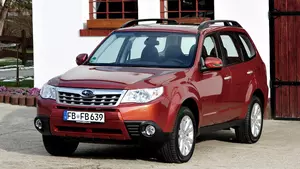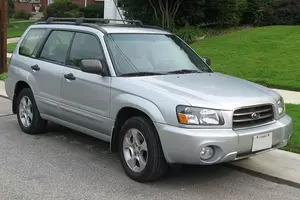
| Vehicle | Curb weight | Difference from world's smallest | Weight to power ratio | 0—60 mph acceleration ratio | Consumption ratio |
|---|---|---|---|---|---|
| e-Boxer 2.0 |
1655 kg / 3649 lbs |
1230 kg (2712 lbs) heavier | 11 kg to 1 hp | 148 kg/s (326 lbs/s) | - |
| Vehicle | e-Boxer 2.0 |
|---|---|
| Curb weight |
1655 kg / 3649 lbs |
| Difference from world's smallest | 1230 kg (1230 lbs) heavier |
| Weight to power ratio | 11 kg to 1 hp |
| 0—60 mph acceleration ratio | 148 kg/s (326 lbs/s) |
| Consumption ratio | - |

| Vehicle | Curb weight | Difference from world's smallest | Weight to power ratio | 0—60 mph acceleration ratio | Consumption ratio |
|---|---|---|---|---|---|
| Sport 2.0 T |
1624 kg / 3581 lbs |
1199 kg (2644 lbs) heavier | 7 kg to 1 hp | 229 kg/s (505 lbs/s) |
191 kg/L (421 lbs/L) |
| 2.0d |
1625 kg / 3583 lbs |
1200 kg (2646 lbs) heavier | 11 kg to 1 hp | 173 kg/s (381 lbs/s) |
319 kg/L (703 lbs/L) |
| 2.0i |
1485 kg / 3274 lbs |
1060 kg (2337 lbs) heavier | 10 kg to 1 hp | 147 kg/s (324 lbs/s) |
228 kg/L (503 lbs/L) |
| Trend 2.0i |
1494 kg / 3294 lbs |
1069 kg (2357 lbs) heavier | 10 kg to 1 hp | 148 kg/s (326 lbs/s) |
217 kg/L (478 lbs/L) |
| Sport 2.0d |
1670 kg / 3682 lbs |
1245 kg (2745 lbs) heavier | 11 kg to 1 hp | 178 kg/s (392 lbs/s) |
265 kg/L (584 lbs/L) |
| Platinum 2.0i |
1570 kg / 3462 lbs |
1145 kg (2525 lbs) heavier | 10 kg to 1 hp | 140 kg/s (309 lbs/s) |
224 kg/L (494 lbs/L) |
| Vehicle | Sport 2.0 T |
|---|---|
| Curb weight |
1624 kg / 3581 lbs |
| Difference from world's smallest | 1199 kg (1199 lbs) heavier |
| Weight to power ratio | 7 kg to 1 hp |
| 0—60 mph acceleration ratio | 229 kg/s (505 lbs/s) |
| Consumption ratio |
191 kg/L (421 lbs/L) |
| Vehicle | 2.0d |
| Curb weight |
1625 kg / 3583 lbs |
| Difference from world's smallest | 1200 kg (1200 lbs) heavier |
| Weight to power ratio | 11 kg to 1 hp |
| 0—60 mph acceleration ratio | 173 kg/s (381 lbs/s) |
| Consumption ratio |
319 kg/L (703 lbs/L) |
| Vehicle | 2.0i |
| Curb weight |
1485 kg / 3274 lbs |
| Difference from world's smallest | 1060 kg (1060 lbs) heavier |
| Weight to power ratio | 10 kg to 1 hp |
| 0—60 mph acceleration ratio | 147 kg/s (324 lbs/s) |
| Consumption ratio |
228 kg/L (503 lbs/L) |
| Vehicle | Trend 2.0i |
| Curb weight |
1494 kg / 3294 lbs |
| Difference from world's smallest | 1069 kg (1069 lbs) heavier |
| Weight to power ratio | 10 kg to 1 hp |
| 0—60 mph acceleration ratio | 148 kg/s (326 lbs/s) |
| Consumption ratio |
217 kg/L (478 lbs/L) |
| Vehicle | Sport 2.0d |
| Curb weight |
1670 kg / 3682 lbs |
| Difference from world's smallest | 1245 kg (1245 lbs) heavier |
| Weight to power ratio | 11 kg to 1 hp |
| 0—60 mph acceleration ratio | 178 kg/s (392 lbs/s) |
| Consumption ratio |
265 kg/L (584 lbs/L) |
| Vehicle | Platinum 2.0i |
| Curb weight |
1570 kg / 3462 lbs |
| Difference from world's smallest | 1145 kg (1145 lbs) heavier |
| Weight to power ratio | 10 kg to 1 hp |
| 0—60 mph acceleration ratio | 140 kg/s (309 lbs/s) |
| Consumption ratio |
224 kg/L (494 lbs/L) |

| Vehicle | Curb weight | Difference from world's smallest | Weight to power ratio | 0—60 mph acceleration ratio | Consumption ratio |
|---|---|---|---|---|---|
| 2.0 |
1613 kg / 3557 lbs |
1188 kg (2620 lbs) heavier | 7 kg to 1 hp | 227 kg/s (501 lbs/s) |
190 kg/L (419 lbs/L) |
| 2.5 |
1513 kg / 3336 lbs |
1088 kg (2399 lbs) heavier | 9 kg to 1 hp | 161 kg/s (355 lbs/s) |
185 kg/L (408 lbs/L) |
| Vehicle | 2.0 |
|---|---|
| Curb weight |
1613 kg / 3557 lbs |
| Difference from world's smallest | 1188 kg (1188 lbs) heavier |
| Weight to power ratio | 7 kg to 1 hp |
| 0—60 mph acceleration ratio | 227 kg/s (501 lbs/s) |
| Consumption ratio |
190 kg/L (419 lbs/L) |
| Vehicle | 2.5 |
| Curb weight |
1513 kg / 3336 lbs |
| Difference from world's smallest | 1088 kg (1088 lbs) heavier |
| Weight to power ratio | 9 kg to 1 hp |
| 0—60 mph acceleration ratio | 161 kg/s (355 lbs/s) |
| Consumption ratio |
185 kg/L (408 lbs/L) |

| Vehicle | Curb weight | Difference from world's smallest | Weight to power ratio | 0—60 mph acceleration ratio | Consumption ratio |
|---|---|---|---|---|---|
| 2.0i |
1475 kg / 3252 lbs |
1050 kg (2315 lbs) heavier | 10 kg to 1 hp | 145 kg/s (320 lbs/s) |
197 kg/L (434 lbs/L) |
| 2.0 |
1540 kg / 3396 lbs |
1115 kg (2459 lbs) heavier | 10 kg to 1 hp | 157 kg/s (346 lbs/s) |
261 kg/L (576 lbs/L) |
| Vehicle | 2.0i |
|---|---|
| Curb weight |
1475 kg / 3252 lbs |
| Difference from world's smallest | 1050 kg (1050 lbs) heavier |
| Weight to power ratio | 10 kg to 1 hp |
| 0—60 mph acceleration ratio | 145 kg/s (320 lbs/s) |
| Consumption ratio |
197 kg/L (434 lbs/L) |
| Vehicle | 2.0 |
| Curb weight |
1540 kg / 3396 lbs |
| Difference from world's smallest | 1115 kg (1115 lbs) heavier |
| Weight to power ratio | 10 kg to 1 hp |
| 0—60 mph acceleration ratio | 157 kg/s (346 lbs/s) |
| Consumption ratio |
261 kg/L (576 lbs/L) |

| Vehicle | Curb weight | Difference from world's smallest | Weight to power ratio | 0—60 mph acceleration ratio | Consumption ratio |
|---|---|---|---|---|---|
| 2.0X |
1405 kg / 3098 lbs |
980 kg (2161 lbs) heavier | 9 kg to 1 hp | 124 kg/s (273 lbs/s) |
151 kg/L (333 lbs/L) |
| 2.5XS |
1495 kg / 3296 lbs |
1070 kg (2359 lbs) heavier | 9 kg to 1 hp | - |
161 kg/L (355 lbs/L) |
| 2.5XT |
1485 kg / 3274 lbs |
1060 kg (2337 lbs) heavier | 6 kg to 1 hp | 261 kg/s (576 lbs/s) |
139 kg/L (306 lbs/L) |
| 2.0TD XS EC-VQ |
1570 kg / 3462 lbs |
1145 kg (2525 lbs) heavier | 11 kg to 1 hp | 159 kg/s (351 lbs/s) |
249 kg/L (549 lbs/L) |
| Vehicle | 2.0X |
|---|---|
| Curb weight |
1405 kg / 3098 lbs |
| Difference from world's smallest | 980 kg (980 lbs) heavier |
| Weight to power ratio | 9 kg to 1 hp |
| 0—60 mph acceleration ratio | 124 kg/s (273 lbs/s) |
| Consumption ratio |
151 kg/L (333 lbs/L) |
| Vehicle | 2.5XS |
| Curb weight |
1495 kg / 3296 lbs |
| Difference from world's smallest | 1070 kg (1070 lbs) heavier |
| Weight to power ratio | 9 kg to 1 hp |
| 0—60 mph acceleration ratio | - |
| Consumption ratio |
161 kg/L (355 lbs/L) |
| Vehicle | 2.5XT |
| Curb weight |
1485 kg / 3274 lbs |
| Difference from world's smallest | 1060 kg (1060 lbs) heavier |
| Weight to power ratio | 6 kg to 1 hp |
| 0—60 mph acceleration ratio | 261 kg/s (576 lbs/s) |
| Consumption ratio |
139 kg/L (306 lbs/L) |
| Vehicle | 2.0TD XS EC-VQ |
| Curb weight |
1570 kg / 3462 lbs |
| Difference from world's smallest | 1145 kg (1145 lbs) heavier |
| Weight to power ratio | 11 kg to 1 hp |
| 0—60 mph acceleration ratio | 159 kg/s (351 lbs/s) |
| Consumption ratio |
249 kg/L (549 lbs/L) |

| Vehicle | Curb weight | Difference from world's smallest | Weight to power ratio | 0—60 mph acceleration ratio | Consumption ratio |
|---|---|---|---|---|---|
| 2.5i |
1455 kg / 3208 lbs |
1030 kg (2271 lbs) heavier | 8 kg to 1 hp | - | - |
| 2.0 X |
1360 kg / 2999 lbs |
935 kg (2062 lbs) heavier | 11 kg to 1 hp | 126 kg/s (278 lbs/s) |
160 kg/L (353 lbs/L) |
| 2.0 XT |
1410 kg / 3109 lbs |
985 kg (2172 lbs) heavier | 8 kg to 1 hp | 178 kg/s (392 lbs/s) |
144 kg/L (318 lbs/L) |
| 2.5 i 16V Turbo |
1455 kg / 3208 lbs |
1030 kg (2271 lbs) heavier | 7 kg to 1 hp | 243 kg/s (536 lbs/s) | - |
| Vehicle | 2.5i |
|---|---|
| Curb weight |
1455 kg / 3208 lbs |
| Difference from world's smallest | 1030 kg (1030 lbs) heavier |
| Weight to power ratio | 8 kg to 1 hp |
| 0—60 mph acceleration ratio | - |
| Consumption ratio | - |
| Vehicle | 2.0 X |
| Curb weight |
1360 kg / 2999 lbs |
| Difference from world's smallest | 935 kg (935 lbs) heavier |
| Weight to power ratio | 11 kg to 1 hp |
| 0—60 mph acceleration ratio | 126 kg/s (278 lbs/s) |
| Consumption ratio |
160 kg/L (353 lbs/L) |
| Vehicle | 2.0 XT |
| Curb weight |
1410 kg / 3109 lbs |
| Difference from world's smallest | 985 kg (985 lbs) heavier |
| Weight to power ratio | 8 kg to 1 hp |
| 0—60 mph acceleration ratio | 178 kg/s (392 lbs/s) |
| Consumption ratio |
144 kg/L (318 lbs/L) |
| Vehicle | 2.5 i 16V Turbo |
| Curb weight |
1455 kg / 3208 lbs |
| Difference from world's smallest | 1030 kg (1030 lbs) heavier |
| Weight to power ratio | 7 kg to 1 hp |
| 0—60 mph acceleration ratio | 243 kg/s (536 lbs/s) |
| Consumption ratio | - |

| Vehicle | Curb weight | Difference from world's smallest | Weight to power ratio | 0—60 mph acceleration ratio | Consumption ratio |
|---|---|---|---|---|---|
| 2.0 S -Turbo |
1445 kg / 3186 lbs |
1020 kg (2249 lbs) heavier | 9 kg to 1 hp | 181 kg/s (399 lbs/s) | - |
| 2.0 |
1380 kg / 3043 lbs |
955 kg (2106 lbs) heavier | 11 kg to 1 hp | 134 kg/s (295 lbs/s) | - |
| 2.5 4WD |
1380 kg / 3043 lbs |
955 kg (2106 lbs) heavier | 8 kg to 1 hp | 134 kg/s (295 lbs/s) | - |
| Vehicle | 2.0 S -Turbo |
|---|---|
| Curb weight |
1445 kg / 3186 lbs |
| Difference from world's smallest | 1020 kg (1020 lbs) heavier |
| Weight to power ratio | 9 kg to 1 hp |
| 0—60 mph acceleration ratio | 181 kg/s (399 lbs/s) |
| Consumption ratio | - |
| Vehicle | 2.0 |
| Curb weight |
1380 kg / 3043 lbs |
| Difference from world's smallest | 955 kg (955 lbs) heavier |
| Weight to power ratio | 11 kg to 1 hp |
| 0—60 mph acceleration ratio | 134 kg/s (295 lbs/s) |
| Consumption ratio | - |
| Vehicle | 2.5 4WD |
| Curb weight |
1380 kg / 3043 lbs |
| Difference from world's smallest | 955 kg (955 lbs) heavier |
| Weight to power ratio | 8 kg to 1 hp |
| 0—60 mph acceleration ratio | 134 kg/s (295 lbs/s) |
| Consumption ratio | - |